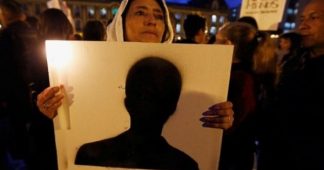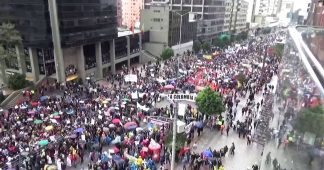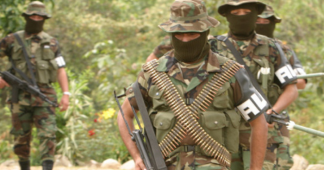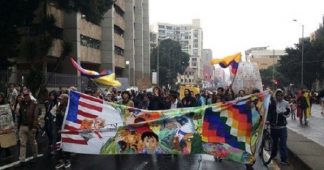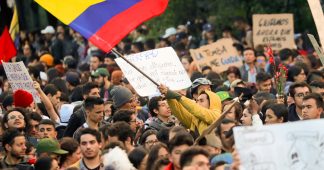Despite protests of historic proportions fueled by anger over corruption and a brutal right-wing crackdown, the unrest in Colombia has garnered remarkably little international media attention compared to Venezuela.
by Alan Macleod and Whitney Webb
February 21st, 2020
Many of the massive anti-neoliberal protest movements that exploded across the globe last year have pressed on into 2020, especially those that rose up throughout Latin America. Many of those demonstrations — clearly newsworthy due to their enormous size, composition, and motives — were and continue to be ignored by prominent English language news outlets, essentially creating a media blackout of these movements.
This trend has been particularly magnified in Latin American countries whose current governments are closely allied with the United States, with Colombia, in particular, standing out. Despite being faced with protests from hundreds of thousands of people fueled by anger over state corruption, proposed neoliberal reforms and a spike in murders of social leaders, the unrest in Colombia has garnered remarkably little international media attention.
In contrast, U.S.-supported right-wing movements attempting to topple socialist governments like those in Venezuela and Bolivia have received a great deal of coverage and open support from both the media and the political class.
It is certainly telling that international media outlets largely ignored the protests of Colombia’s teachers, who were motivated to act largely due to a dangerous wave of violence targeting them incited by the government itself, leading to several murders and hundreds of death threats in the span of just a few months. Colombia’s President Iván Duque’s political mentor Álvaro Uribe, himself president between 2002 and 2010, accused the country’s teachers of brainwashing the youth: “Teachers only teach them to yell and to insult, not how to debate, warping their minds,” he said.
That story was overlooked in the media, likely due to the close ties between the country’s conservative government and the United States. Colombia remains the continent’s top recipient of American military aid, despite the fact that the U.S. government itself has disclosed ties between Colombia’s military, former President Uribe and the illegal drug trade.
Colombian teachers protest to defend their lives
Of the recent protests that have taken place in Colombia, the strikes led by Colombian teachers and one of the main teachers’ unions in the country — the Colombian Federation of Education Workers (Fecode) — have received almost no coverage in English-language media. The Fecode-led strikes revolve not around demands for better wages or increased funding for public education but around the slew of death threats and recent murders that have targeted Colombia’s education workers.
“Our teachers continue to be threatened and attacked,” said Fecode head Nelson Alcaron, “This government is indolent. It isn’t taking measures to protect their lives,” he added, noting that 240 have been threatened this year alone. “We live in a country that kills children, that kills social leaders, with a government that is against peace…That is why we have to change something. We cannot continue to live like this,” another protester said.
Though the fact that Colombian teachers are protesting in defense of their very lives is clearly newsworthy, adding to the importance of the demonstrations is the fact that these murders and death threats are closely tied to Colombia’s current government led by President Iván Duque. Duque and his political allies have incited violence against the country’s teachers, and those affiliated with Fecode in particular. The president’s political party, the Democratic Center, have stepped up their rhetoric towards education workers, asserting that teachers’ unions, namely Fecode, “must disappear” while some Democratic Center politicians have moved to criminalize teacher protests and strikes and fire any teachers who make political statements deemed non-essential to the subject they teach
As these verbal attacks have grown, teachers in Colombia have been increasingly targeted, especially after Fecode-led strikes and demonstrations took place during the latter half of last year denouncing a new wave of threats towards teachers which they assert are linked to Duque’s political base. One demonstration in August was partially spurred by the brutal murder of school principal Orlando Gómez, who was abducted from the school where he worked and then murdered after having received numerous death threats for his educational work in the violence-plagued Cauca region.
As noted by Fecode during a 24-hour teacher strike “in defense of the lives of teachers” that took place last September, 10 teachers were murdered and another 700 received death threats during Duque’s first year in office. Fecode claimed the murders and death threats were directly related to “a systematic social media campaign of harassment and outright lies against educators and their students” led by Democratic Center activists and leaders.
Yet, since 2020 began, the wave in violence against teachers has continued to grow. In the first two weeks of February alone, one teacher was murdered, a regional coordinator of Fecode survived an assassination attempt, an entire school was forced to close down due to death threats made against teachers, and 15 Fecode-linked teachers were forced to flee the town where they lived and worked. Last week, death threats were sent to an additional 25 teachers ahead of their school’s plan to commemorate a massacre committed by a paramilitary group 25 years ago. In response to the wave of violence and threats, Fecode announced another strike to take place in coming weeks to both highlight and denounce the dangerous situation faced by Colombian teachers.
Western media ignore largest strike in over 40 years
One reason for the jump in violence targeting Fecode and Colombian teachers may be due to the fact that their demonstrations helped to spur much larger protests that have united diverse factions and groups in Colombian society in their opposition to various right-wing policies of the Colombian government. Following the Fecode-led demonstrations in August and September of last year, a massive national strike and anti-government protests saw hundreds of thousands take to the streets last November amid a backdrop of anti-government demonstrations in several other Latin American countries, including Chile and Ecuador. Today, seven million Colombian students have been left without teachers amid a massive strike.
The national strike was joined, not just by Fecode, but by the country’s labor unions, student groups, indigenous and Afro-Colombian communities and farmers, among others. It was the largest national strike to take place in Colombia since the late 1970s and was met by the Duque government with curfews, border closures, rubber bullets and teargas, with at least one person killed by a police projectile.
Since November, however, the national strikes and general anti-government sentiment have continued, with national strikes and related demonstrations taking place in December and January. Another strike is planned for Friday and a separate strike is scheduled to take place in March. Protest organizers asserted last month that these actions will continue “until something changes,” with the high rate of murders targeting social leaders remaining one of the main complaints of those demonstrating.
While the protests have gripped Colombia, they have barely been reported in the Western press, with coverage of the monthslong rebellion garnering barely a few, disinterested mentions. CNN, for example, appears not to have discussed the events for over two months. When mentioned at all, the idea that the protests are largely the result of “foreign meddling” (CNN) from Venezuela or “Russian trolls” (New York Times) is often floated.

In comparison, there was widespread coverage of and immediate support for the right-wing protests and coup attempt that brought down Bolivia’s socialist president Evo Morales in November, with media falsely claiming he had resigned (CBS News) due to election fraud (New York Times). Collectively, corporate media welcomed the fall of a supposed “full-blown dictatorship” (Miami Herald) and the “restoration of democracy” (The Economist).
State-backed terror and “low-intensity democracy” in Colombia
One reason for the lack of media coverage likely owes to the decades-long U.S.-Colombia alliance. In order to cover the popular movements against Duque’s government, the media would have to acknowledge the gravity of Colombia’s current situation, which would then increase international pressure on Duque and his administration to address the issues that motivate the protests, something the U.S. government does not support.
Duque was elected president in May 2018 to much fanfare from the Western press. The election took place under a generalized state of terror, his leftist challenger Gustavo Petro narrowly escaping an assassination attempt, while many of his supporters were less lucky. This was the first election in which the left felt they had a chance of gaining power since the assassination of President Jorge Gaitan in 1947, an event that sparked decades of civil war. Right-wing paramilitary death squads linked to the government issued public death threats, promising to kill those who voted for Petro. In addition to the intimidation tactics, there was also widespread vote buying; American human rights lawyer Daniel Kovalik, an election observer, was mistaken for a voter and offered money to vote for Duque. There were over 1,000 official electoral fraud complaints
Despite this, corporate media heralded the flawed election as a victory for democracy, downplaying or flatly ignoring its failings. For example, CNN stressed that “though there have been isolated incidents of violence related to the election, they have been minimal,” suggesting that the only fear voters had was that Petro would swing the country “dangerously to the left.” Meanwhile, Al-Jazeera creatively told its readers that there was a “taboo” against voting for leftists in Colombia. After his victory, Donald Trump invited Duque to the White House where he said that it was “a great honor” to be “working very closely” with him, especially on regime change in Venezuela. In comparison, the Venezuelan election taking place at the same time, overseen and praised by 150 international observers was written off as a “heavily rigged” (New York Times) “farce cementing autocracy” (Huffington Post) and the “coronation of a dictator” (The Independent), despite the lack of evidence of fraud.
Duque, as previously mentioned, is the protege of Álvaro Uribe, a man once ranked by the U.S. Defense Intelligence Agency “on a list of 104 important narco-traffickers contracted by the Colombian narcotics cartels” and who was alleged to have served as the “head of Colombia’s paramilitary groups” by former paramilitary members prior to and during his time as president.
Under Uribe, the government carried out a years-long series of extrajudicial murders and massacres that resulted in over 10,000 deaths. Dubbed the “False Positives Scandal,” Colombian forces would murder anyone they wished, later claiming their victims were members of the leftist revolutionary army the FARC. Through this practice, the military could impose its rule across the country through terror and by disappearing those who opposed it. One member of Duque’s Democratic Center party, Senator Carlos Meisel, recently called for this Uribe-era program to be reinstated.
This policy was part of a longstanding partnership with the United States to control the country through force. Thousands of soldiers and other security forces have been trained at the notorious School of the Americas in Fort Benning, GA (now rebranded as the Western Hemisphere Institute for Security). There, recruits are taught that communist subversion is a cancer that must be immediately eradicated through force to ensure freedom across the Americas. They are instructed on torture techniques based off Gestapo manuals. Signs of communism, leaked instruction books show, include criticizing the judiciary or police, unrest among labor or student groups, striking, questioning the government, circulating petitions and refusing to pay rents and taxes. Indeed, as historian Doug Stokes found, one manual entitled Revolutionary War, Guerrillas and Communist Ideology noted that participation in the democratic process was a dangerous sign of subversion, as communists can “resort to subverting the government by means of elections in which the insurgents cause the replacement of an unfriendly government official to one favourable to their cause.”
The forces trained by the School of the Americas took the message to heart and made Colombia by far and away the most dangerous country in the world to be an activist. According to the United Nations, a minimum of 107 human rights defenders were killed in 2019, with the number of those killed in 2020 already hitting double digits, something the U.N. High Commissioner on Human Rights describes as a “staggering,” “vicious and endemic cycle of violence and impunity.” More trade unionists are killed in Colombia than all other countries combined, with over 2,000 killed between 1991 and 2006, alone according to Amnesty International. Meanwhile, 52 journalists have been killed since 1992, compared to just five in Venezuela (none of whom were killed by the government).
Uribe and other presidents partnered closely with the U.S. in its “Plan Colombia” program, a campaign ostensibly aimed at reducing drug production but whose real target was the local population and leftist militias such as FARC. Colombia has some of the most fertile, unspoiled land on the planet, and underneath lies a mountain of oil and valuable minerals. Under the guise of eradicating coca production, the U.S. and its local partners have forced millions of people off their ancestral land, impoverishing them in the process. And if they refuse to leave, they are often killed and labeled as FARC terrorists afterward.
As a consequence of near-constant violence, Colombia has the largest internally displaced population in the world. 16 percent of the country — some 7.7 million people — have been forced from their homes in a massively underreported genocide, a disproportionate amount of them from black or indigenous backgrounds. For context, Syria’s displaced population numbers 6.2 million.
Yet because Colombia has for decades been a close ally of the United States and Europe, the country continues to be referred to as a “democracy.” This has led to academics coming up with new phrases to explain the apparent paradox, including “low-intensity democracies,” “undemocratic democracies” and even “genocidal democracies.”
The fact that so many groups — students, unionists, victims of violence, farmers and teachers — are on the streets in such numbers protesting today is a testament to their fortitude, given the long history of violence meted out by the government and its death squads. But like in Chile, young and the disadvantaged are beginning to break the spell and lose their fear. While the outcome is far from certain, the conviction of those protesting is not in doubt.
Feature photo | Police detain a protester in Bogota, Colombia, Jan. 21, 2020. Student and labor groups called for new protests as they hope to reignite demonstrations against President Ivan Duque that brought thousands to the streets late last year with a wide range of grievances with his conservative government. Ivan Valencia | AP
* Whitney Webb is a MintPress News journalist based in Chile. She has contributed to several independent media outlets including Global Research, EcoWatch, the Ron Paul Institute and 21st Century Wire, among others. She has made several radio and television appearances and is the 2019 winner of the Serena Shim Award for Uncompromised Integrity in Journalism.
* Alan MacLeod is a Staff Writer for MintPress News. After completing his PhD in 2017 he published two books: Bad News From Venezuela: Twenty Years of Fake News and Misreporting and Propaganda in the Information Age: Still Manufacturing Consent. He has also contributed to Fairness and Accuracy in Reporting, The Guardian, Salon, The Grayzone, Jacobin Magazine, Common Dreams the American Herald Tribune and The Canary.
Published at https://www.mintpressnews.com/media-silent-millions-quietly-protest-colombia/265096/
